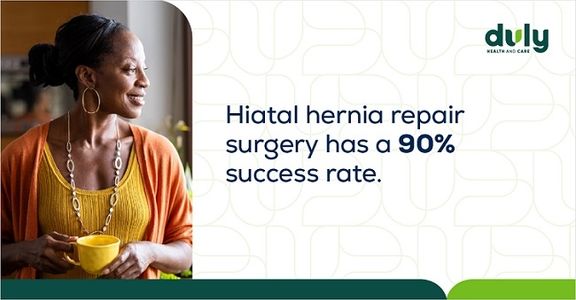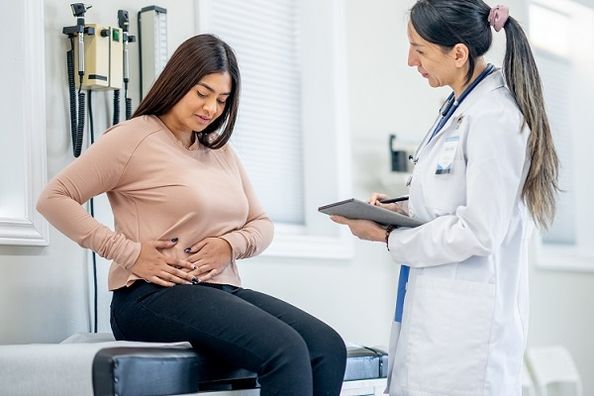You’ve heard the word “hernia,” but you’ve never known exactly what it means. But now, your provider has told you that you have a hiatal hernia and that they recommend repair surgery. And now you’re wondering – what exactly is a hernia, and why do I need surgery.
A hernia is when a part of an organ or tissue bulges through a weak area of a muscle. In most cases, hernias are in the abdomen (belly).
A hiatal hernia is when the top of your stomach bulges through the hiatus (opening) of your diaphragm (the large muscle that separates your abdomen and chest). Hiatal hernias typically don’t cause symptoms or need to be treated. But in some cases, they need to be repaired with surgery.
Hiatal Hernia Repair Surgery: Key Facts at a Glance
- Hiatal hernia repair surgery is about 90% effective, helping most patients find long-term relief from acid reflux and heartburn.
- Surgery is typically recommended when symptoms like chronic reflux or difficulty swallowing don’t improve with medication.
- Common symptoms of a hiatal hernia include heartburn, regurgitation, shortness of breath, and a persistent cough.
- Recovery usually takes 2 to 6 weeks, with most people returning to work or light activity within 1 to 2 weeks after surgery.
- Most hiatal hernia repairs are minimally invasive, using laparoscopic or robotic techniques that result in smaller incisions, less pain, and quicker healing.
If your provider has recommended hiatal hernia repair surgery, here are answers to common questions about the procedure.
Who Needs Hiatal Hernia Repair Surgery?
Common symptoms, like heartburn and acid reflux, can often be treated with medications like antacids. However, your provider may suggest surgery if your hernia has caused:
- Severe symptoms, like heartburn or acid reflux, that don’t get better with medication
- Complications like serious inflammation or narrowing of your esophagus
- Chronic cough or recurrent respiratory issues caused by acid reflux
- Chronic inflammation in your lungs (pneumonia)
- Risk of strangulation (a medical emergency where your stomach gets trapped and cuts off blood supply)
- Complications like ulcers, bleeding, or difficulty swallowing or breathing
Not sure where to start? Schedule a visit with a Duly primary care provider to discuss your symptoms and next steps. If surgery is recommended, we’ll connect you with a specialist.
Find a Primary Care near you >
What Happens During Surgery?
Hiatal hernia repair is usually a minimally invasive surgery, meaning the surgeon will only need to make a few small cuts rather than a large incision.
During the surgery, your surgeon will reposition your stomach and tighten the hiatus. They will wrap the upper stomach (fundus) around the lower part of your esophagus and attach it with stitches or surgical staples. This reinforces the valve and reduces acid reflux.
Also read: What is a Hernia?
How Do I Prepare for Surgery?
Before the day of the surgery, your provider will do a physical exam and may order tests like bloodwork and imaging. They will discuss the risks of the procedure and what to expect when it’s done.
They will give you detailed instructions for prepping for surgery. Instructions might vary a little from person to person, depending on factors like other medical conditions. In general, instructions include:
- Fasting for at least 8 hours before surgery
- Showering with antibacterial soap
- Arranging for transportation home
Your provider might also have you stop taking certain medications, like blood thinners, before the surgery. However, you should not stop or change medications if you haven’t been instructed to do so.
Also read: Procedure & Surgery Checklist
How Long Does It Take to Recover?
Most people stay in the hospital for 1 to 2 days after surgery. You will receive medications to relieve pain and prevent infection.
Once you’re home, patience is key for a successful recovery. You will need to wait about 1 to 2 weeks to return to work, and your provider may recommend waiting longer or taking it easy if your job involves a lot of movement or lifting more than 10 pounds.
Also, you will need to make some temporary diet changes. For a few weeks after surgery, you will be limited to clear liquids and will need to gradually progress to soft foods. Don’t be alarmed if you lose weight – because of the diet changes, most people lose about 10 to 15 pounds.
The good news is that these changes are fairly short-lived. A full recovery generally takes between 2 and 6 weeks, so you’ll be back on your feet and eating solid foods before you know it.
A Word from Our Doctor:
“Hiatal hernias never go away on their own. The longer you wait, the harder the surgery, the higher the risk of complications, and the greater the chance of recurrence — so it’s best to fix them while they’re small.”
– Dr. Jihad Kudsi, MD, MBA, FACS, Board Certified Surgeon and Obesity Medicine Physician, Chair of Surgery and Clinical Board of Directors at Duly Health and Care & Medical Director of Bariatric Surgery at UChicago AdventHealth LaGrange Hospital
Don’t wait for symptoms to get worse. Our Duly surgeons use state-of-the-art, minimally invasive technology to treat patients across Chicagoland and surrounding suburbs. Get expert hernia care close to home, and schedule an appointment with a Duly gastroenterologist or surgeon to discuss your treatment options.
Is Recovery From Hiatal Hernia Surgery Painful?
Fortunately, there is minimal pain associated with hiatal hernia repair. You may have some mild pain or soreness around your abdomen and incision sites, but that will go away within a few days. It’s also possible to have some shoulder pain for the first day or two due to gas left in your abdomen during the surgery.
Your provider might have you take pain medication for the first few days, but the amount you need should decrease quickly as the incisions heal and you get back to your everyday activities.
How Successful Is Hiatal Hernia Repair?
Very!
Most people can stop taking medications and be acid reflux-free after surgery.

A hiatal hernia can eventually return, but it’s usually after many years. The hernia won’t necessarily cause the same symptoms, and a second surgery can often permanently fix the problem.
How Else Can I Relieve Hernia Symptoms?
You don’t need to wait for surgery to start taking steps to feel better. Lifestyle changes might not fully treat symptoms, but they can offer some relief while you wait for your procedure.
Some of these changes include:
- Eating smaller meals to reduce pressure on your stomach
- Avoiding laying down for a few hours after eating (it may be helpful to have dinner earlier)
- Cutting down on fatty or fried foods that trigger heartburn
- Keeping your head elevated at night and sleeping on your left side to prevent acid reflux during sleep (a special wedge pillow might help with this)
- Taking over-the-counter antacids or antihistamines
Also read: Laparoscopic Hiatal Hernia Repair
More Hiatal Hernias FAQs
1. Can a hiatal hernia heal on its own?
No, a hiatal hernia does not heal by itself. However, many small hernias don’t cause symptoms and don’t require treatment. Lifestyle changes and medications can help manage mild symptoms. Surgery is only needed if the hernia causes severe or persistent problems.
2. Will I need to follow a special diet forever after surgery?
No. Diet changes are usually temporary. For the first few weeks after surgery, you’ll be on a liquid or soft-food diet to allow your stomach to heal. After that, most people return to a regular diet without restrictions.
3. How long will I need to take off work after hiatal hernia surgery?
Most patients can return to light work within 1 – 2 weeks. If your job involves heavy lifting or physical activity, your provider may recommend a longer recovery period.
4. Can a hiatal hernia come back after surgery?
Yes, but it’s uncommon. If it does recur, it’s usually many years later and may not cause the same symptoms. If needed, a second surgery can often provide a long-term fix.
5. Is laparoscopic or robotic surgery better than open surgery?
Yes, in most cases. Minimally invasive approaches, such as laparoscopic or robotic surgery, involve smaller incisions, less pain, and faster recovery compared to traditional open surgery. Robotic surgery offers enhanced precision and flexibility for the surgeon, which can be beneficial in complex cases. Your surgeon will recommend the best approach based on your specific condition.
Maintaining a healthy weight and stopping smoking can also help relieve symptoms. And since obesity and smoking cigarettes are risk factors for developing hernias, staying at a healthy weight and avoiding tobacco may help prevent you from getting more hernias in the future.
If you think you may have a hernia, schedule an appointment with a primary care provider at Duly Health and Care, a surgeon, or a gastroenterologist.
Health Topics:








